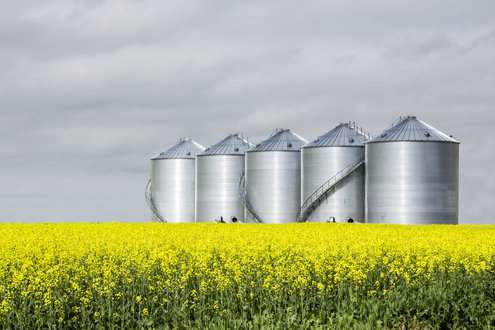Alberta representative shares his top lessons-learned from 2016
By Jennifer Jackson
This year, some Prairies farmers may have experienced first-hand that Mother Nature does not always play nice. With a surplus of rain throughout the season and a snowy harvest, some producers could not catch a break.
As 2016 nears its end, farmers have the opportunity to review their crop production strategies and how they stood up to the season.
Farms.com asked Jason Casselman, territory account manager for Dekalb, Monsanto Canada Inc. in Peace Country, Alberta, to elaborate on the year.

Nathan4847/iStock/GettyImagesPlus
Farms.com: What were your top-three lessons-learned from the 2016 growing season?
Casselman:
1. Tank mix your glyphosate.
With the amount of moisture we had (this season), there was a lot of weed pressure – they just kept coming. (This was made worse by) the limited amount of spray days we had available because of the moisture. A lot of the weed (pressure) could have been avoided if (producers) had tank mixed their glyphosate in their pre-seed burn-off.
Spicing up your mix with another effective mode of action – especially ahead of cereals – will help prevent the buildup of Group 1 and 2 resistant weed populations on the farm. The pre-seed burn off window gives us the chance to add in a residual product that will continue to control early emerging weeds that otherwise compete with the crop.
Scouting fields ahead of the sprayer to determine weed size and what is growing in the field is critical to getting the right rate and right tank mix partner.
2. Choose canola varieties by field
Not every field on the farm is the same – they shouldn’t all be planted (with) the same canola variety. Soil type, drainage, fertility, harvest management are all factors to consider when picking a canola variety for each field. Pick the best variety for each field based on agronomic performance from local data and recommendations.
If you have a field that you know you can get on early and want to be able to swath and harvest early, a field that you want to try straight cutting on, or even one that you know you can push the fertility and has the biggest yield potential, (consider the) differences in canola hybrids. Talk to your seed company agronomist and make sure you are getting the right hybrid for each field.
Picking different varieties essentially helps with time management. This past season, because of the moisture and late harvest, things were piling up for farmers – everything was (maturing) at the same time. With some varieties, you know (the crop) will mature earlier.
3. Disease management
Sometimes when we talk disease management we just think about applying a fungicide, but there (are) lots of ways to help manage crop diseases. Crop rotation, variety selection, seed treatments and tillage are just some of the agronomic decisions to look at when trying to get the best quality and highest return on your investment.
This season, there were a lot of (farmers who) couldn’t get out to spray because of the wet fields. Maybe you can’t get in the field to spray, but whether it’s picking the right variety, having a proper crop rotation or using a seed treatment, you have technically been managing disease right from the start.
We missed out on a lot of fungicide applications this year – but there is more that can be done than only spraying.
Click here to see more...